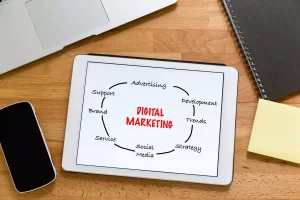Digital marketing for law firms is not any different from digital marketing of other industries. The same rules apply, only that some strategies may work better for law firms compared to other industries. Perhaps defining digital marketing is a good place to start, followed by a focus on how it applies to the legal industry and the strategies to implement for successful outcomes.
Digital marketing is the integration of different techniques, technologies, and information to enter new markets, create brand awareness, or promote your products and services. It all depends on the goal you are trying to achieve. The broader goal, however, usually is to acquire new clients and retain existing ones.

When we narrow down the concept of digital marketing for law firms, it can best be described as the process of using established best practices to make your legal business more visible online. This involves the integration of the different techniques and technologies to improve your reach in the digital ecosystem, encourage repeat business, strengthen relationships with digital clients, and most importantly, to attract new clients. If you can’t wrap your head around anything you just read, the most fundamental thing to take with you regarding digital marketing for law firms is that it is a necessity that you cannot do without in this digital era.
To make good use of this necessity, as already mentioned, you need to implement best practices for a good return on investment (ROI). Below is a guide of the best practices you need to implement to stand out in the currently saturated legal market both in terms of brand awareness and competitive advantage.
Set Clear Goals
For you to consider digital marketing for your law firm, it means you have a goal in mind. Setting clear goals is the first step in digital marketing best practices. The goals should range from short-term to intermediate and long-term. They should also be SMART, meaning specific, measurable, achievable, relevant, and time-bound. An example of a goal that meets all these dynamics is get 200 unique visitors through organic search every week.
Have a Marketing Budget
Once you have a clear goal, you need to have a budget. According to statistical data, only 57% of law firms create an annual budget for their marketing. This means that 43% of those in the legal industry are yet to understand the impact of marketing on their revenue.
Implementing an effective digital marketing strategy and achieving you desired goals are almost impossible without a designated budget. With a budget, you will know what strategies to implement based on your set goals and expected revenue. However, the rule of thumb is to invest 7%-8% of your firm’s annual revenue in your marketing.
Build a Well-Designed Website
A law firm content marketing report published by Madavi Agency revealed that 87% of law firms have a website and believe and consider it as their main marketing strategy. Further, 96% of people seek legal advice online before booking an appointment with an attorney.
Therefore, you would want to ensure that your law firm’s website can meet the needs of users seeking such information. The goal is to ensure that your website is current, clean, loads quickly, and is optimized for mobile. Failure to consider these dynamics may cause a high bounce rate, which, in turn, affects traffic and leads generated.
Optimize Your Site for Search Engines
Building a well-designed website goes hand-in-hand with search engine optimization (SEO) of your website’s content. SEO is the only reason people will find you online when they searching for legal advice on the internet because it helps you rank higher on search engine results pages (SERPs).

Some of the best practices to implement include targeting local and trending keywords, optimizing individual web pages to help compete with local firms by making it easier for search engines to read and index your content, and categorizing your website to make it easy for users to find the pages they want. When done right, SEO can work wonders for your online visibility.
Integrate Content Marketing
Content is king and is a significant part of the process of optimizing your website for search engines. A 2024 law firm marketing report by Madavi Agency shows that 55% of website traffic comes from blogging, which is one of the most effective content marketing strategies. Other forms of content marketing include email marketing, video marketing, and social media marketing, among others.
For effectiveness and a good return on investment, you need to ensure that your content is relevant, meets the needs of users, authoritative, current, and informative. Quality content have an added advantage of helping you build your backlink portfolio, where people will find you through content posted by others who link to your website.
Claim Free Online Profiles
Whereas most law firms consider their websites as the most critical component of their online presence and thereby marketing, it is not the only place users who are searching for legal services can find you. Clients are always looking for social proof before hiring an attorney and lawyer review sites, as well as social media, provide free online profiles, where you get to interact with the different forms of feedback that clients give.
This, in turn, improves your position in local listings and rankings in search engine results pages. You can take advantage of this effective marketing tool to boost the visibility of your law firm and to retain your existing clients since by responding to their feedback, you will improve their customer experience.

Boost Your Social Media Presence
Social media is a great source of information for potential clients looking to hire an attorney. When social media is used effectively, it doubles lead generation and increases conversion rate by 4% for law firms. The legal industry has not fully embraced social media as a marketing strategy. Therefore, you can stay ahead of competition by embracing this relatively new marketing strategy for law firms and potentially secure a good number of the 74% of users who do research about legal services on social media.
As a form of content marketing, you should ensure you post relevant, accurate, and informative content on social media on a regular basis for consistency and to build your audience. You can also take advantage of current trends, such as short form videos and social media analytics to maximize your social media marketing efforts.
Leverage Pay-per-Click (PPC) Advertising
If I haven’t mentioned it yet, you have to spend for your digital marketing efforts to earn you the desired revenue. PPC advertising is a form of digital marketing where you have to invest by paying search engines, such as Google for every click your ad receives.
The advantage of this form of marketing is that search engines place your content and website in front of the right users. This increases the quality of leads you get, which increases conversions and sales for your legal business. The fact that PPC for lawyers is the most expensive compared to PPC for other industries is proof of the value you are assured when you use it to boost your online visibility.
Conclusion
This list of digital marketing is quite comprehensive but not exhaustive of all the techniques you can use to help your legal business reach the right target market and improve your brand awareness and conversions. However, it includes the most critical components of digital marketing for law firms you can implement for a good ROI. If you find all these too technical for you to handle on your own, or maybe your billable hours don’t allow you the time, you may consider hiring the services of a digital marketing agency for best results.
